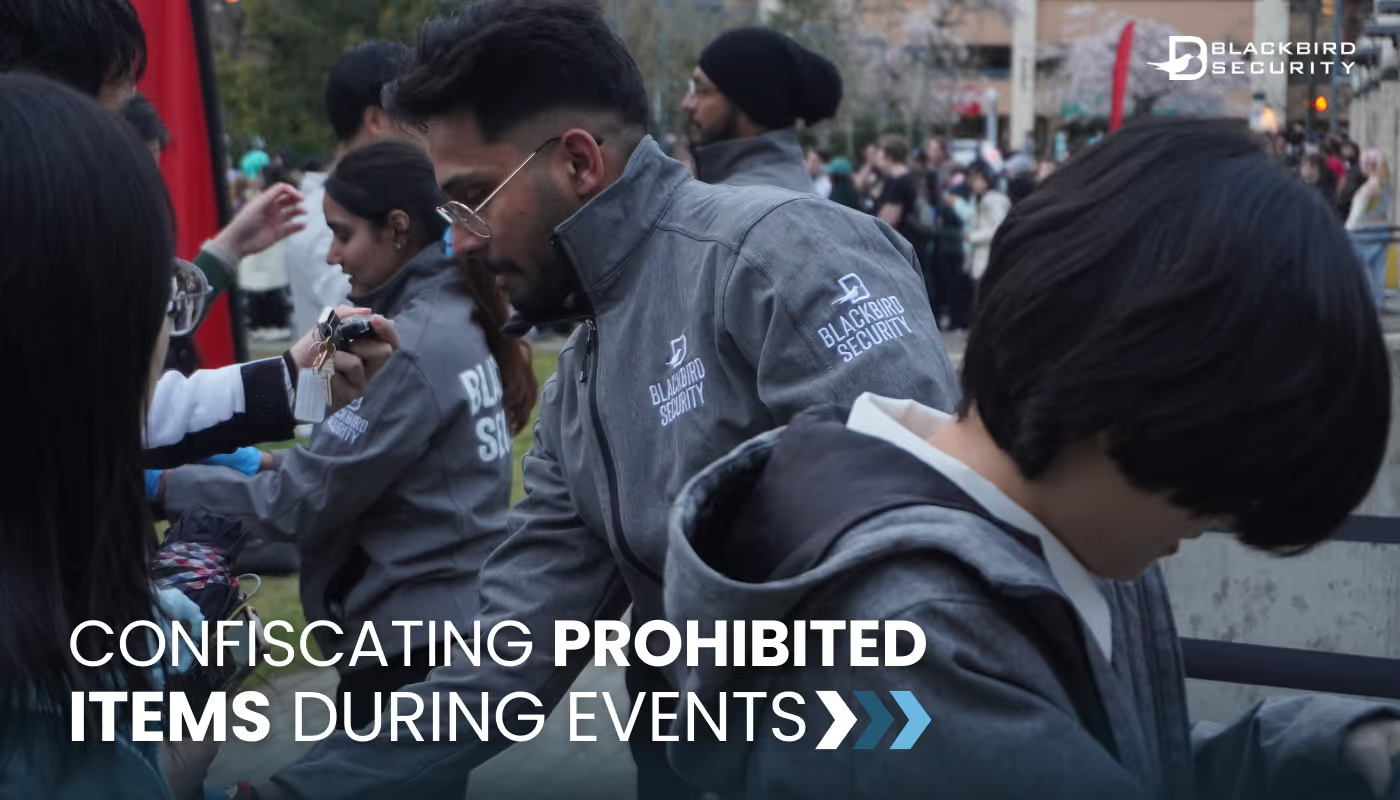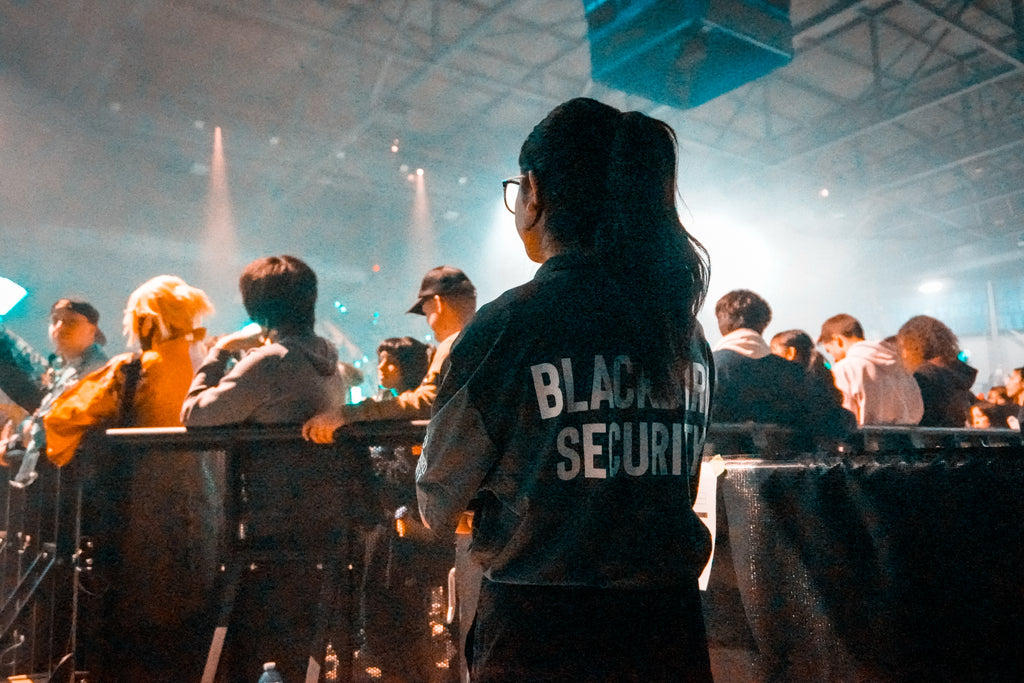Back
Back

Vancouver is home to a large number of major events, music festivals, concert arenas, and other event venues which require thorough safety measures. An important part of an event or concert security guard’s job involves confiscating prohibited items. While some attendees may bring prohibited items unintentionally, others may purposely carry them for malicious purposes. It’s up to event security guards to provide a safe and respectful confiscation procedure, making sure that attendees feel listened to and respected while preventing situations from escalating into something more dangerous.

Any weapons, items that could be used as a weapon, or items that may cause an accident or injury, must be confiscated during the bag check process. This includes items that are not typically considered dangerous. For instance, closed disposable water bottles can seriously injure performers and crowd members when thrown, while signs attached to poles can fall into crowds or create tripping hazards.
While some attendees may be upset or frustrated by the process, especially when it comes to unassuming items, a thorough confiscation routine provides a safe venue for all attendees, performers, vendors, and event staff. Event security guards must calmly and professionally explain the reasons behind confiscations to reduce the chances of escalation and anger among attendees.
Generally, every venue has a slightly different list of items attendees are prohibited from bringing inside. However, items that are designed or likely to cause physical harm are not permitted at any event for safety reasons. Here’s a list of the most commonly banned items:
Weapons (knives, pepper spray, spikes, etc.)
Drugs or drug paraphernalia
Alcohol (or outside alcohol at 19+ events)
Laser pointers
Fireworks or flares
Depending on a given venue’s rules, security guards may also confiscate:
Reusable water bottles
Disposable water bottle lids
Signs attached to poles
Recording equipment
Air horns and other aerosols
Oversized items (large umbrellas, folding chairs, etc.)
Outside food and drink
It’s important for attendees to be aware of a venue’s prohibited item policy in advance of the event to ensure they won’t be required to relinquish any personal belongings during the bag check process. As a security guard, it’s critical to memorize your venue’s prohibited items list to keep the event as safe as possible for guests.

While venues may have differing confiscation procedures, here is a breakdown of the general steps event security guards take when confiscating an item from an attendee:
Some events may have a posted list of prohibited items that attendees can view in line prior to reaching the bag check station. This provides an opportunity to empty out water bottles or dispose of outside food and drink before entering the venue, speeding up bag check lines in the process.
Prior to the start of the bag check, security guards will ask attendees for their consent to be searched. To learn more about bag check procedures, read our previous blog, Event and Concert Security Pat-Down Protocols.
Event security guards learn the venue’s prohibited items well in advance of the event. If a security guard identifies a prohibited item during a bag check, they will ask the attendee to remove it from their bag and place it on a nearby surface or hand it to the guard, depending on the nature of the item.
The security guard will clearly and calmly explain to the attendee why the prohibited item is not allowed inside the venue. They will answer any questions raised by the attendee and employ peaceful de-escalation techniques to ensure the encounter remains as non-confrontational as possible.
Guards should inform attendees that they have the option of leaving if they do not wish to relinquish their prohibited item. If legal escalation is not required and the attendee accepts the confiscation, the guard allows the attendee to proceed through to the remainder of the check-in process.
Some venues may offer to return confiscated non-illegal items to attendees following the event, depending on their policies.
The guard deposits the item at a secure location, typically into a guarded box near the bag check station. Illegal items, such as large knives, guns, or drugs, may need to be further escorted to a secure location at the venue to prevent accidental injury or misuse.
If an illegal item is found on the attendee’s person, the security guard will alert their supervisor and may call the police. The individual may also be detained by security guards in a secure location for questioning once authorities arrive. Event security guards will take action according to venue policies and decisions made by their supervisor.
Following the confiscation of an illegal item, the guard will write a report summarizing the nature of the item, the time it was confiscated, the name of the attendee, and any actions taken. Event security guards may not be required to write a report for minor confiscations, depending on the specific needs of the event.
If an event security guard feels unsure about a particular item, they’re encouraged to call their supervisor for help in making a decision.
Not all prohibited items are treated with the same level of severity. In the vast majority of cases, the discovery of a prohibited item does not require the intervention of police or a supervisor. Keep in mind that venues differ in their responses to particular items.
In the case of non-illegal items that do not pose a safety threat, security guards may issue a warning without confiscating the item. If a security guard finds a box of cigarettes in an attendee’s bag, for example, they may allow them to carry it into the event while issuing a warning against smoking inside.
For items that are concerning but not illegal, such as drug paraphernalia or recording equipment, security guards should inform their supervisor and defer to them for decision-making. Supervisors may decide to deny entry without confiscating the item, depending on venue policies.
Illegal items require a call to the police, along with the detainment of the attendee who brought the illegal item to the venue. These items can include guns, large knives, and drugs in quantities exceeding legally permitted amounts. Individuals who bring these items will not be permitted inside the venue, as they may be acting with malicious intent and could pose a serious threat to attendees and staff.
Learn more about how event security guards collaborate with law enforcement in our previous blog.

A high-quality event security company can make the difference between a disorganized and potentially dangerous event and a smooth one. At Blackbird Security, we have extensive experience safeguarding major events in Vancouver, including concerts at the UBC Thunderbird Arena, the Aritzia Warehouse Sale, Battle of BC 7, and many more. Venue owners and leaders trust our highly trained guards to deliver premium event security services that keep attendees and staff safe throughout major events.
Learn how we can protect your Vancouver event venue by contacting us.



